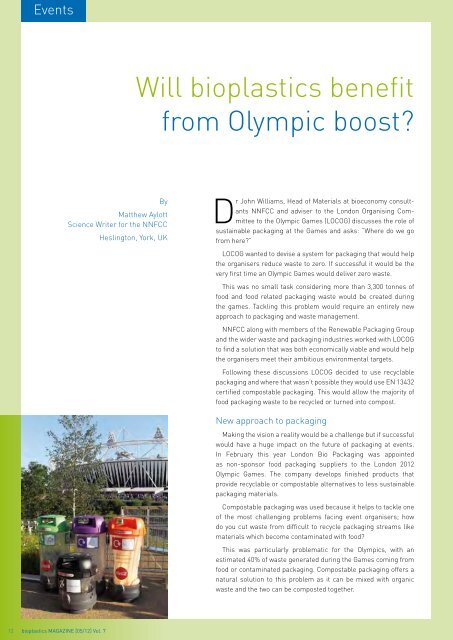bioplasticsMAGAZINE_1205
bioplasticsMAGAZINE_1205
bioplasticsMAGAZINE_1205
You also want an ePaper? Increase the reach of your titles
YUMPU automatically turns print PDFs into web optimized ePapers that Google loves.
Events<br />
Will bioplastics benefit<br />
from Olympic boost?<br />
By<br />
Matthew Aylott<br />
Science Writer for the NNFCC<br />
Heslington, York, UK<br />
Dr John Williams, Head of Materials at bioeconomy consultants<br />
NNFCC and adviser to the London Organising Committee<br />
to the Olympic Games (LOCOG) discusses the role of<br />
sustainable packaging at the Games and asks: “Where do we go<br />
from here?”<br />
LOCOG wanted to devise a system for packaging that would help<br />
the organisers reduce waste to zero. If successful it would be the<br />
very first time an Olympic Games would deliver zero waste.<br />
This was no small task considering more than 3,300 tonnes of<br />
food and food related packaging waste would be created during<br />
the games. Tackling this problem would require an entirely new<br />
approach to packaging and waste management.<br />
NNFCC along with members of the Renewable Packaging Group<br />
and the wider waste and packaging industries worked with LOCOG<br />
to find a solution that was both economically viable and would help<br />
the organisers meet their ambitious environmental targets.<br />
Following these discussions LOCOG decided to use recyclable<br />
packaging and where that wasn’t possible they would use EN 13432<br />
certified compostable packaging. This would allow the majority of<br />
food packaging waste to be recycled or turned into compost.<br />
New approach to packaging<br />
Making the vision a reality would be a challenge but if successful<br />
would have a huge impact on the future of packaging at events.<br />
In February this year London Bio Packaging was appointed<br />
as non-sponsor food packaging suppliers to the London 2012<br />
Olympic Games. The company develops finished products that<br />
provide recyclable or compostable alternatives to less sustainable<br />
packaging materials.<br />
Compostable packaging was used because it helps to tackle one<br />
of the most challenging problems facing event organisers; how<br />
do you cut waste from difficult to recycle packaging streams like<br />
materials which become contaminated with food?<br />
This was particularly problematic for the Olympics, with an<br />
estimated 40% of waste generated during the Games coming from<br />
food or contaminated packaging. Compostable packaging offers a<br />
natural solution to this problem as it can be mixed with organic<br />
waste and the two can be composted together.<br />
12 bioplastics MAGAZINE [05/12] Vol. 7


















